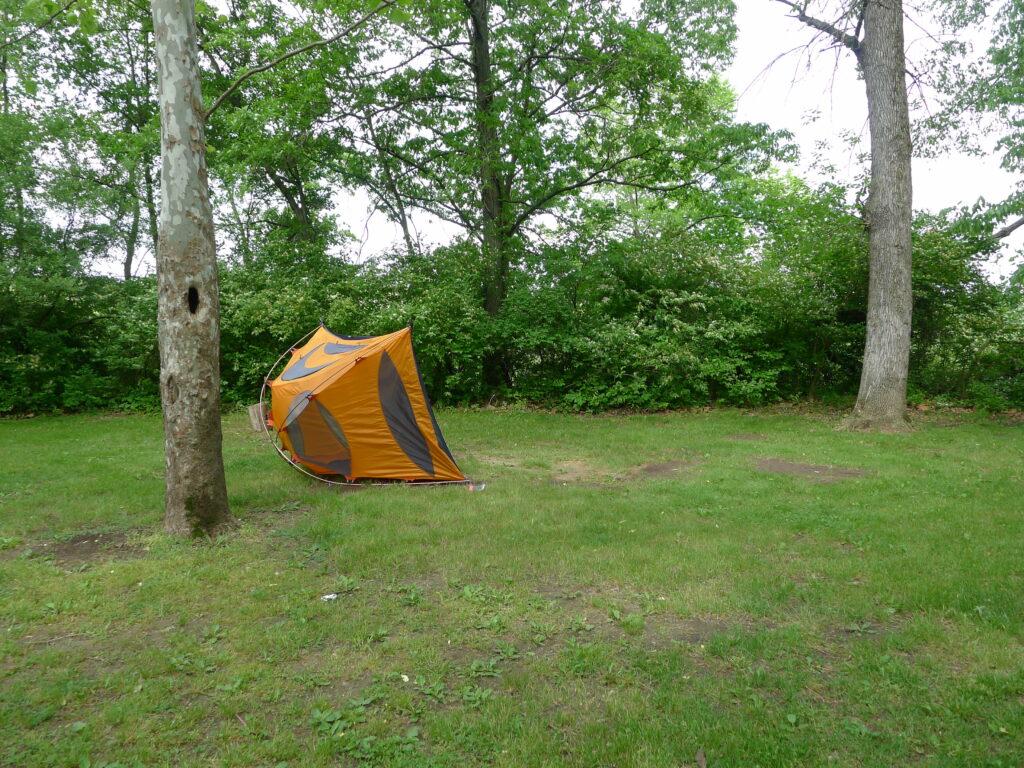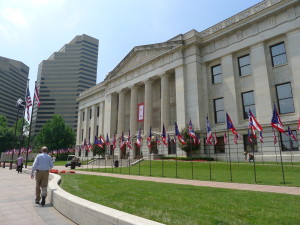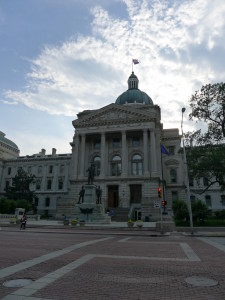We woke to a foggy, humid Monday. Columbus, Ohio was our first stop. Emily is into government and politics, and she used to work at the Massachusetts state house, so we try to visit state capitols when we travel. With a lot of ground to cover, there wasn’t time to tour the inside, but from the outside the building represented its state well: it was flat and unremarkable, with well-manicured grounds. The area in general seemed surprisingly affluent, and the state house employees we saw were snappy dressers.
A few hours’ drive brought us to another capitol, Indianapolis, which was more in line with our expectations. The dress code was “state worker chic”, meaning the cheapest attire that could be considered appropriate in a formal office. The other people milling around the capitol building looked pretty down-and-out, as did most of the parts of the city we drove through, which made us reluctant to leave the car containing our most valued worldly possessions unattended for too long.
The skies over Columbus were clear and a brutal sun beat down on us there, but for most of the day we drove under cover of clouds. Ideally we wanted to camp in Illinois’ Kickapoo State Park (I certainly haven’t made an exhaustive survey but that’s got to be one of the best-named parks in the country), but we had a back-up hotel reserved in nearby Champaign just in case. As the cancellation deadline drew near, we checked the weather report one last time: isolated thunderstorms, 60% chance of precipitation, but no severe storm warnings. We cancelled the hotel and made for Kickapoo.
It’s a good thing we were driving west, or else we would have arrived after dark. Not that it’s so difficult to make camp in the dark, but it’s nicer to have some daylight. The tent loop was nearly empty, so we had our pick of sites. Despite the fact that it was built on a former strip mine, the park was quite nice-looking, and the only drawback were the giant mosquitos who loved to come into the car and tent but weren’t actually too aggressive about trying to bite us. As we made ready for bed, we could see flashes of lightning in the distance, but that was nothing unexpected.
We’d been asleep for about two hours when heavy winds and rain woke us. The tent’s fly and waterproofing were doing their job, so I was inclined just to stick it out and try to go back to sleep, but Emily gets a bit more anxious about such things, so she took shelter in the car. A few minutes later she came back to tell me that she’d just heard on the weather radio that there was a tornado watch in effect.
I grabbed my things and dashed through the driving rain to join her in the car. The nearest hotel was two exits back the way we came on the highway, so we drove quickly but cautiously in that direction. A car is one of the worst places to be in a tornado, but a tent isn’t too far below it, and we needed the car to get to a safer place.
As we drove through on the storm along largely deserted roads, it certainly occurred to me that we might be overreacting. No one else seemed to be fleeing the campground, and one thing I’ve learned from David Foster Wallace is that extreme weather is commonplace in Illinois. It’s entirely possible that we were just being gunshy city slickers. Being woken in the middle of the night, listening to wind and rain whip around you while lightning flashes dramatically in the sky, these things tend to put one on edge. Besides, at this point, even if we somehow determined that it was safe back at the campground, we might be too on edge to sleep well there.
We pulled into the parking lot of a Best Western in nearby Danville. I checked their rates online – even being chased by a tornado I’m too much of a nit to risk getting gouged with a walk-in price, and saw that the hotel was well-reviewed and just $80 for the night. I called from the parking lot to reserve a room, but the clerk told me they were sold out. So we sat in the car while the rain fell around us, listening to the crackling weather radio and checking satellite images of the storm.
After about two hours, the worst of the storm was past and the tornado watch seemed to have been lifted. We returned to the campsite and slept surprisingly well for the rest of the night.
My smartphone often seems like little more than an expensive GPS. I rarely get time-sensitive email, and I can count the number of important phone calls I get in a month on one hand. Outside of Google Maps, the only apps I use with any regularity are Bravo (to check the action at the local casino), Angry Birds, and Flashcard Machine (to study Spanish in between hands at the poker table).
When I’m on the road, though, it suddenly becomes a lot more useful. Despite the fact that I had the cell and date service suspended, I actually used it in Europe more than I ever had before, both for keeping important travel information ready-to-hand and for offline city maps and pocket translators. Even if we were overreacting, it felt good to be able to find a hotel, get directions, check rates, call ahead for a reservation, and monitor the storm all from this one little device.



